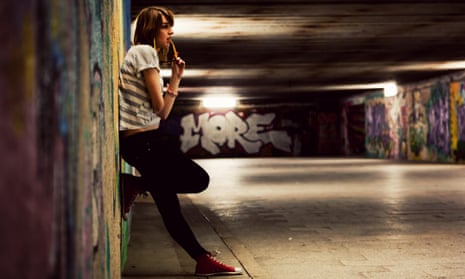In Julie Myerson’s latest work of fiction, the first-person narrator, herself a novelist, receives a fan letter from a student about a book she published some years previously. “I know it’s a novel, but it didn’t feel like one,” the young woman emails. “It felt more like a memoir – something about how direct it was – it almost felt like a confession at times.”
She could well be describing Nonfiction: A Novel. Though Myerson has built up a sizeable backlist of edgy, psychologically dark tales, this 11th novel cuts deeper than any of its predecessors. Its title may sound overly meta, but here is a book that instantly sucks the reader down into a swirling vortex of grief, trauma and powerlessness.
Its theme is teenage drug addiction. As the unnamed narrator – once happily married, successful – looks back on her efforts to save her daughter from self-destruction, she’s prompted to reflect on unresolved feelings for her own withholding, manipulative mother, and her guilt over an affair she fell into with a narcissistic ex-lover.
It’s a self-lacerating exercise that’s impossible to look away from. Sometimes cautious, occasionally accusatory, frequently rinsed of any feeling except stunned horror, the text is addressed throughout to “you”, meaning her daughter, though the reader can’t help but feel somehow implicated.
“When your father and I try to put an order on these things, we seem to lose all grip on chronology,” the narrator explains, and structurally the novel reflects this, weaving back and forth in time, nearing the inevitable before retreating again, establishing a terrible, chaotic momentum as the daughter vanishes, returns to violently demand money, agrees to rehab, overdoses, gets a job, relapses, vanishes once more.
“This is definitely not a ghost story,” we’re told, and yet the narrator is haunted by so much: the soft curve of her only child’s cheek, her every perceived parental misstep, her ability to go back to sleep after waking one fateful night, so full of dread that she cries out. It’s hard to know which are the more painful moments – those when she contemplates what this still-young girl has become and sees nothing there to like, let alone love, or those when merely being able to rest her eyes on that fundamentally unchanged face feels like sweet relief.
Myerson is a stranger to none of this. In 2009 she published The Lost Child, a work of nonfiction that twinned the story of Mary Yelloly, a 19th-century watercolourist who died from tuberculosis at 21, with an account of Myerson’s eldest son Jake’s increasingly heavy use of skunk marijuana, and the decision she and her husband took to kick him out of the family home when he was 17. It unleashed a fearsome backlash, fuelled by Jake’s selling his side of the story to a tabloid newspaper.
Nonfiction inevitably raises questions about what might have come next for the family. In 2014, Jake told an interviewer that he subsequently became addicted to heroin, but Myerson – who has said in interviews that she was driven to a kind of breakdown by The Lost Child furore – has publicly revealed nothing further. In fact, since her 2016 novel The Stopped Heart, which featured grieving parents and missing children, she has written – or at least published – no new book. Has she, like her protagonist, found herself unable to write until now?
“Raw”, a word that will probably be used a lot of Nonfiction, captures its headlong intensity but simultaneously undersells the authorial alchemy at play here. Because this novel blazes with truths about not just addiction but female identity and maternal love, compassion and creativity. And in its bare-knuckle engagement with what it means to be a writer – with the compulsion to turn life into art, whatever the cost, and the extent to which any wordsmith can ever really be trusted – it’s almost shockingly exposing. More so, perhaps, than true nonfiction.
As Myerson’s narrator confides, the awful thing about writers is that nothing stops them chronicling even the most devastating experiences. “Nothing. Once they’ve started, that’s it – they’ll go to any lengths to find the right words.” With this new novel, the author goes further than most and the results are nothing less than incandescent.
Nonfiction by Julie Myerson is published by Corsair (£14.99). To support the Guardian and Observer, order your copy at guardianbookshop.com. Delivery charges may apply
